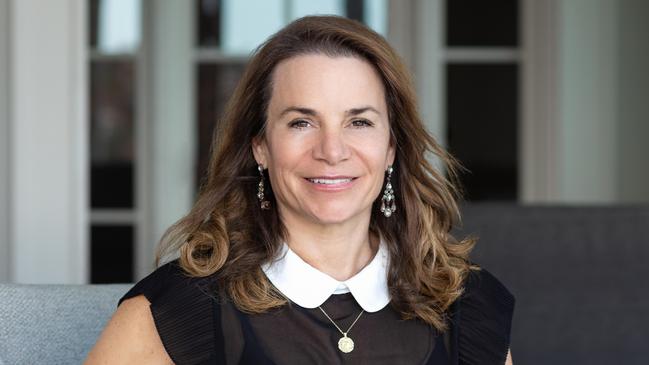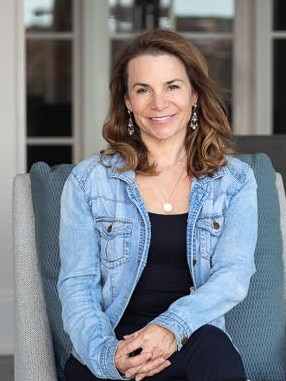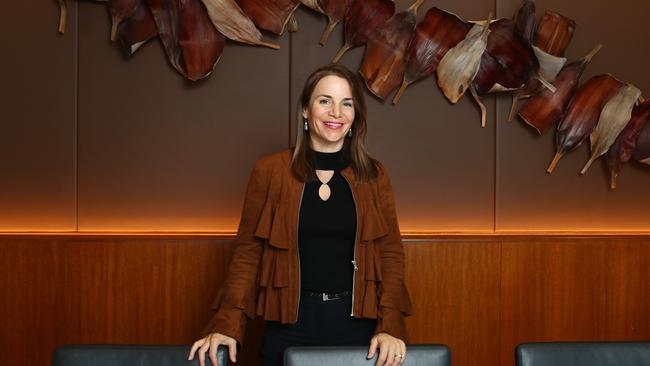How this American from a broken home became a tech queen here and won’t say no to a good idea
Melissa Widner made multimillion-dollar sums from two tech company exits and now wants to help more founders access funding by avoiding the naysayers in venture capital.

Melissa Widner started her first business when she was just 10 years old.
Living in the bustling city of San Jose in Northern California’s Bay Area, she recalls walking home from school one day when she spotted a fellow student – who lived in her apartment block – veering off the path home and into an office building.
When later she asked him what he was doing that afternoon, he revealed he had a job stuffing envelopes for a wage of 70c per 100. She soon joined him.
“So I started stuffing envelopes and it was great money. I could do 300 in an hour, so I was making $2.10 an hour,” she says.
“But then I asked them if I could take the envelopes home and work there. They let me do it so I got all the kids in the apartment complex and started my own business, paying them 50c per 100. One week I made like $70, which was just huge money for a 10 year old.
“For me, it was to make money. My parents were divorced and I had to make my own spending money. So that was the catalyst.”
Widner’s parents had split a year earlier. It shaped her appetite to be a self starter.
“I think I was entrepreneurial before that but when you have a radical change in financial security, that can be highly motivating,” she says.
“I do worry about my kids today because they don’t really have the same motivation that I had.”

At college she started a hair accessories business with her roommate. It was named M&M Bows, after both of their first names. It helped Widner pay for her studies.
After graduating from the University of Washington in Seattle, she ran two businesses which she then successfully sold for small fortunes.
“I’ve had two really successful exits as a CEO and I realised how much luck plays into it. I’m not saying that with any kind of false modesty, it is just absolutely true, especially in the tech space,” she says.
“I went into venture in 2000 and then the market crashed. But I found that a lot of people who were a lot smarter than I was, and who worked longer and harder than I did in other businesses, didn’t have the same successful exits. So timing and luck plays so much into it.”
Today she is CEO of Lighter Capital, a firm started in America in 2010 that has pioneered a non-dilutive, revenue-based financing model allowing founders of technology businesses to pay back a loan from a pre-agreed percentage of revenue, typically 3 per cent to 5 per cent.
Unlike most venture capital lenders, Lighter does not seek warranties, personal guarantees, board seats or equity, so has become an emerging leader in revenue-based financing for business-to-business (BtoB) and software-as-a-service (SAAS) companies.
Widner joined the Lighter Capital board in 2018 when NAB Ventures – the venture capital arm of National Australia Bank – of which she was a managing partner, first invested in the company.
She became CEO in 2020 when Lighter Capital was at risk of going out of business due to Covid-related market uncertainty.
“There was this fear in the company that the whole loan book would blow up. So I got really involved. I have never been involved in a company whose customers love it as much as ours do,” she says.
“It is easy to be loved when you are providing capital without taking equity or control and just providing help. The mission really resonated with me after being an entrepreneur and being in venture for so long.
“Venture capitalists fund such a small percentage of businesses. They get all the press but they fund 1 per cent of tech businesses. As a former venture capitalist, I was primarily just in the rejection business of saying ‘No’ all the time to good companies.”
After Widner turned Lighter Capital around to be profitable, it was launched in Australia in 2021, securing its first institutional warehouse facility with Credit Suisse.
In August this year it secured a further $130m in capital for a credit facility backed by existing investors Apollo Global Management, i80 Group, Invest Victoria and iPartners, an Australian private credit fund.
“It is going great. We have done 1100 rounds since inception,” she says.
“Our decision-making process is completely objective. We are looking at the data and deciding whether we can provide capital based on what we see in the data. If we can’t we can tell them exactly why.”
Turning adversity to advantage
Widner describes her mother, Geri, as an “incredible role model”.
After Geri’s divorce she went from being someone who played tennis, bridge and was carefree to supporting her two young daughters on her own.
“She ended up working and climbed the ladder of a property development firm. That did sink in when I was a kid. She worked very, very hard all the time,” her daughter says.
“She passed away in 2009, right after I moved to Australia, when she was only 66. She was tough, there was not a lot of softness about her. But she was an incredible role model to me.”
Widner was closer to her father, Peter. She was in High School when she left her mother’s home to move in with him in Seattle.
“I had a party when my mother went out of town for work and then she grounded me for life. So I thought ‘Well, rather than being permanently grounded, I will go and live in Seattle’,” she says.
Peter Widner, a smoker and drinker, died after suffering a massive heart attack when he was just 60.
He was long outlasted by his parents, who were 99 and 97 when they passed away in 2015. Their granddaughter adored them.
“I was very close with my dad’s parents,” Widner says.
After finishing school and college, the first business she ran was a financially distressed manufacturing company started in the 1940s called Northwest Industrial Supplies.
One of her friends’ fathers had opportunistically bought the firm and, given the success of Widner’s hair accessories business at college, hired her to run it.
“That was tough and completely unglamorous. But I liked the recurring revenue model. Our customers were schools, hospitals and buildings,” she says.
The business was sold in 1995, generating for the owner a 15-times return on his money.
“I learned a lot so it was a really good experience for me. He gave me a great opportunity and it worked out really well for him and me.”
Widner now says the period after the sale was the wealthiest she has ever felt. All of a sudden she could pay off her mortgage and afford to put herself through Stanford Business School.
“That will be the richest I will ever feel, no matter what happens to me,” she says.
But she did have her wealth put in perspective when she decided to fly to Australia for a holiday and considered splurging on a first-class ticket. Until she realised the price.
“I was like, ‘Who would pay that much for 13 hours of discomfort?’,” she muses.
During her subsequent stint at Stanford, Widner started her second business – known as 7Software, a Silicon Valley based enterprise software company.
She was co-founder with her then Australian-born boyfriend – now her husband – who was the firm’s chief technology officer (CTO)
In 1998 7Software, which automated the industrial procurement process, was acquired by tech giant Concur Technologies for a bumper price, generating a return of more than 10 times to its investors.
“My now husband and I ran the business together – I was the CEO and he was the CTO. We were not married then,” Widner says.
“But I’m glad we sold it. It works really well for some people, husband and wife teams. I like more separation between church and state.”
Given her upbringing, while she always felt she was working in tech for her financial security, it has always been a passion.
“Once you have that security, what is it all about? You realise that working as a start up or with start ups is something you really love. I ended up doing some angel investing in Seattle and started helping women entrepreneurs,” she says.
Calling Australia home
By the time Widner moved to Australia in 2009, she and her husband had three children under the age of 11.
“My husband never really had a dream of living in the US. He always wanted to come back and I always absolutely loved Australia. I joke that we had a verbal pre-nuptial agreement where I said I would try it for a year. I think I like it now more than he does,” she says.
After the birth of her first two children in America, she returned to work almost the day she came out of hospital. For the third she waited just a week.
“With number one, we were selling 7Software and we had to get the deal done by June 30. My son was born June 19. For number two, I had just become a partner at a venture capital firm and we had our annual meeting six days after he was born. You just do it. I had a nanny with my first one. Maybe it was from having a working mum, I never felt like that wasn’t something I couldn’t do,” she says.
She had her fourth child when she had turned 40 after the family had settled in Sydney.
“There’s a different attitude towards having nannies in Australia – maybe that is just because it is a lot harder to do,” she says.
“But I would say in Australia, I think women maybe feel like they have to do it all. My husband works, he has a full-on job. So I’m very envious of women who can have stay at home dads.”

Widner is also now the chair of a not-for-profit that supports female entrepreneurs called Apropela, formerly known as Heads Over Heels.
Her involvement in the group since 2010 draws from her 7Software experience in America, where so many of her introductions came through a female entrepreneurs’ forum she had joined.
“When I moved to Australia, I connected with a few like-minded women. I had been a VC for almost 10 years before that and never saw women pitch me. It was so rare for women to come to us for money,” Widner says.
NAB and Macquarie Group recently renewed their sponsorships of Apropela. Former long-serving Macquarie Group director Diane Grady is a big supporter.
“Asking her to be involved early with Apropela was game changing. She was just a member, but she was so well connected,” Widner says.
“She has been on our advisory council since the early days. She introduced us to Sid Myer, Craig Tiley, David Thodey and others that have been so instrumental to our success.”
She worries Australia does poorly in attracting women to be partners and investment managers in venture capital firms.
But over the past decade and a half she has seen a lot more women entrepreneurs getting funded. Her rallying call to them for the future is simple: “This is a generalisation, but I think women don’t think as big as men. Be yourself and
back yourself,” she says.
“There are lots more role models out there than there were previously so it is a lot easier than it was. But don’t be afraid to think big.”






To join the conversation, please log in. Don't have an account? Register
Join the conversation, you are commenting as Logout